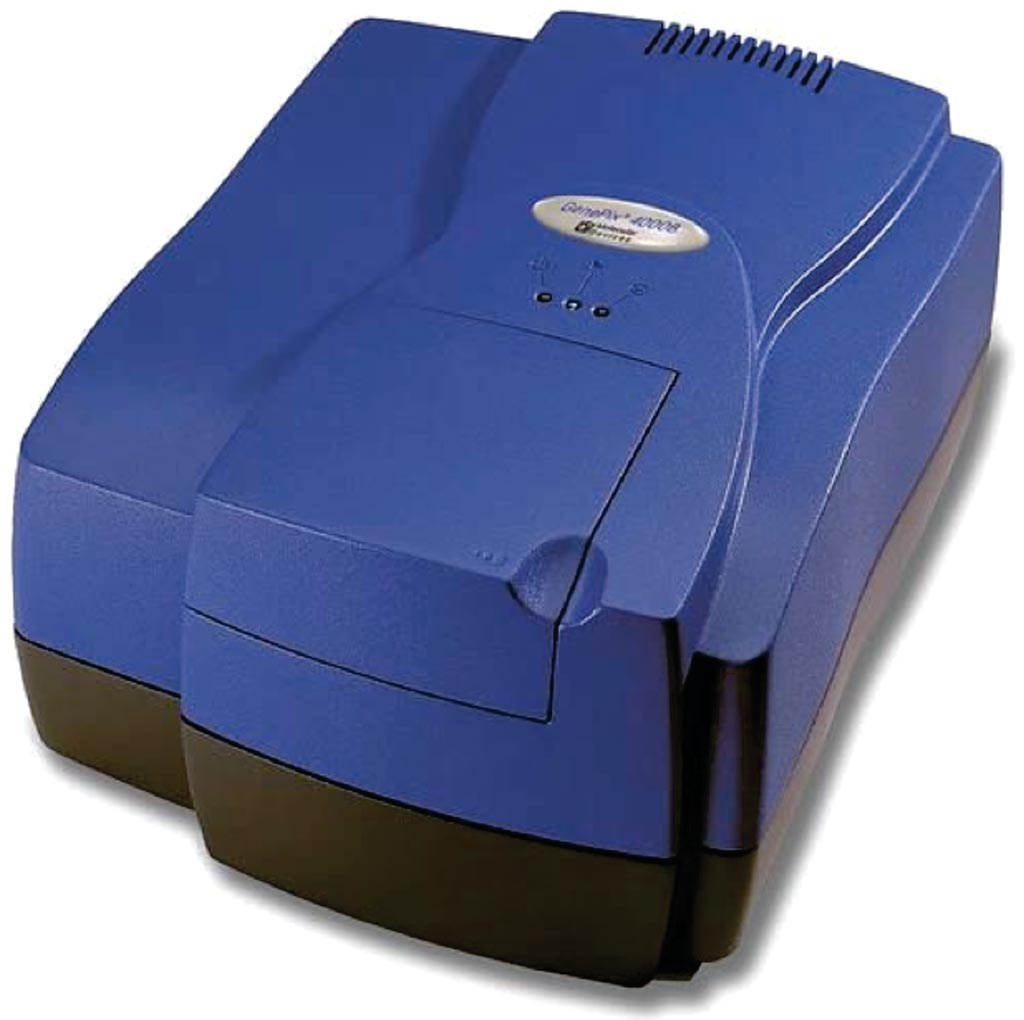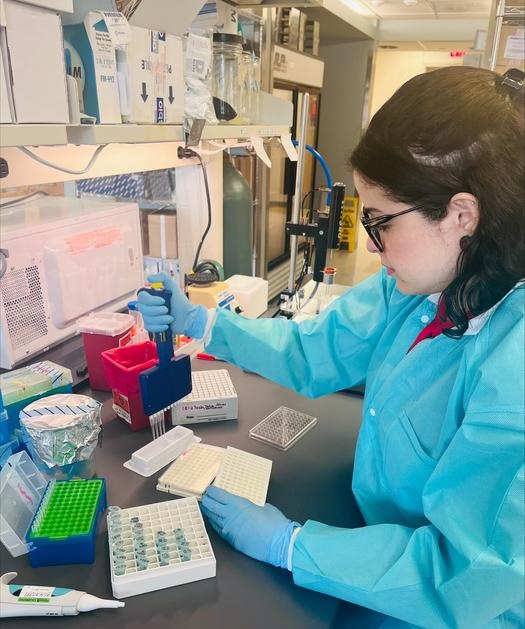Protein Biomarker Found for Early-Stage Lung Cancer
|
By LabMedica International staff writers Posted on 31 May 2018 |

Image: The Genepix 4000B microarray scanner (Photo courtesy of Molecular Devices).
The American Cancer Society (ACS) estimate that in 2018, 154,050 people in the USA will have died from lung cancer and the World Health Organization (WHO) suggest that 1.69 million deaths are brought about by lung cancer worldwide.
Most lung cancers are initially diagnosed at an advanced stage, and so the disease is associated with a poor prognosis, being the leading cause of cancer-related death worldwide. The identification of patients at a resectable early stage of cancer is therefore extremely important.
Scientists at the Kitasato University School of Allied Health Sciences (Kanagawa, Japan) obtained frozen fresh lung cancer tissues and kept at 80 °C until use for proteomic analysis. Sera from 271 patients with lung cancer and 100 healthy controls were used as the training set. In addition, a validation set consisting of sera from 100 patients with lung cancer and 38 healthy controls was also studied.
The team developed monoclonal antibodies to validate their studies. They also performed immunoblotting and the immunoreactive bands on the membranes were detected with Immobilon Western Chemiluminescent HRP Substrate and captured with ATTO Cool Saver System. The team also carried out immunohistochemical staining and for reverse-phase protein array (RPPA) the stained slides were scanned on a microarray scanner Genepix 4000B.
Of the monoclonal antibodies generated, one antibody designated as KU-Lu-1, recognized cytoskeleton-associated protein 4 (CKAP4). CKAP4 was detected in lung cancer cells and tissues, and its secretion into the culture supernatant was also confirmed. The serum CKAP4 levels of lung cancer patients were significantly higher than those of healthy controls. Furthermore, the serum CKAP4 levels were also higher in patients with stage I adenocarcinoma or squamous cell carcinoma than in healthy controls. Serum CKAP4 levels may differentiate lung cancer patients from healthy controls, and they may be detected early even in stage I non–small cell lung cancer. Serum CKAP4 levels were also significantly higher in lung cancer patients than in healthy controls in the validation set.
Yuichi Sato, PhD, a professor of Molecular Diagnostic, and senior author of the study, said, “The use of CKAP4 as a biomarker could change current practices regarding the treatment of lung cancer patients, and the diagnostic accuracies may be markedly improved by the combination of CKAP4 and conventional markers.” The study was published on May 8, 2018, in The American Journal of Pathology.
Related Links:
Kitasato University School of Allied Health Sciences
Most lung cancers are initially diagnosed at an advanced stage, and so the disease is associated with a poor prognosis, being the leading cause of cancer-related death worldwide. The identification of patients at a resectable early stage of cancer is therefore extremely important.
Scientists at the Kitasato University School of Allied Health Sciences (Kanagawa, Japan) obtained frozen fresh lung cancer tissues and kept at 80 °C until use for proteomic analysis. Sera from 271 patients with lung cancer and 100 healthy controls were used as the training set. In addition, a validation set consisting of sera from 100 patients with lung cancer and 38 healthy controls was also studied.
The team developed monoclonal antibodies to validate their studies. They also performed immunoblotting and the immunoreactive bands on the membranes were detected with Immobilon Western Chemiluminescent HRP Substrate and captured with ATTO Cool Saver System. The team also carried out immunohistochemical staining and for reverse-phase protein array (RPPA) the stained slides were scanned on a microarray scanner Genepix 4000B.
Of the monoclonal antibodies generated, one antibody designated as KU-Lu-1, recognized cytoskeleton-associated protein 4 (CKAP4). CKAP4 was detected in lung cancer cells and tissues, and its secretion into the culture supernatant was also confirmed. The serum CKAP4 levels of lung cancer patients were significantly higher than those of healthy controls. Furthermore, the serum CKAP4 levels were also higher in patients with stage I adenocarcinoma or squamous cell carcinoma than in healthy controls. Serum CKAP4 levels may differentiate lung cancer patients from healthy controls, and they may be detected early even in stage I non–small cell lung cancer. Serum CKAP4 levels were also significantly higher in lung cancer patients than in healthy controls in the validation set.
Yuichi Sato, PhD, a professor of Molecular Diagnostic, and senior author of the study, said, “The use of CKAP4 as a biomarker could change current practices regarding the treatment of lung cancer patients, and the diagnostic accuracies may be markedly improved by the combination of CKAP4 and conventional markers.” The study was published on May 8, 2018, in The American Journal of Pathology.
Related Links:
Kitasato University School of Allied Health Sciences
Latest Immunology News
- Diagnostic Blood Test for Cellular Rejection after Organ Transplant Could Replace Surgical Biopsies
- AI Tool Precisely Matches Cancer Drugs to Patients Using Information from Each Tumor Cell
- Genetic Testing Combined With Personalized Drug Screening On Tumor Samples to Revolutionize Cancer Treatment
- Testing Method Could Help More Patients Receive Right Cancer Treatment
- Groundbreaking Test Monitors Radiation Therapy Toxicity in Cancer Patients
- State-Of-The Art Techniques to Investigate Immune Response in Deadly Strep A Infections
- Novel Immunoassays Enable Early Diagnosis of Antiphospholipid Syndrome
- New Test Could Predict Immunotherapy Success for Broader Range Of Cancers
- Simple Blood Protein Tests Predict CAR T Outcomes for Lymphoma Patients
- Cell Sorter Chip Technology to Pave Way for Immune Profiling at POC
- Chip Monitors Cancer Cells in Blood Samples to Assess Treatment Effectiveness
- Automated Immunohematology Approaches Can Resolve Transplant Incompatibility
- AI Leverages Tumor Genetics to Predict Patient Response to Chemotherapy
- World’s First Portable, Non-Invasive WBC Monitoring Device to Eliminate Need for Blood Draw
- Predictive T-Cell Test Detects Immune Response to Viruses Even Before Antibodies Form
- Single Blood Draw to Detect Immune Cells Present Months before Flu Infection Can Predict Symptoms
Channels
Clinical Chemistry
view channel
3D Printed Point-Of-Care Mass Spectrometer Outperforms State-Of-The-Art Models
Mass spectrometry is a precise technique for identifying the chemical components of a sample and has significant potential for monitoring chronic illness health states, such as measuring hormone levels... Read more.jpg)
POC Biomedical Test Spins Water Droplet Using Sound Waves for Cancer Detection
Exosomes, tiny cellular bioparticles carrying a specific set of proteins, lipids, and genetic materials, play a crucial role in cell communication and hold promise for non-invasive diagnostics.... Read more
Highly Reliable Cell-Based Assay Enables Accurate Diagnosis of Endocrine Diseases
The conventional methods for measuring free cortisol, the body's stress hormone, from blood or saliva are quite demanding and require sample processing. The most common method, therefore, involves collecting... Read moreMolecular Diagnostics
view channel.jpg)
New Respiratory Syndromic Testing Panel Provides Fast and Accurate Results
Respiratory tract infections are a major reason for emergency department visits and hospitalizations. According to the CDC, the U.S. sees up to 41 million influenza cases annually, resulting in several... Read more
New Synthetic Biomarker Technology Differentiates Between Prior Zika and Dengue Infections
Until now, researchers and clinicians have lacked diagnostic tools to easily differentiate between past infections with different flaviviruses—a family of mostly mosquito- and tick-borne viruses that include... Read moreHematology
view channel
Next Generation Instrument Screens for Hemoglobin Disorders in Newborns
Hemoglobinopathies, the most widespread inherited conditions globally, affect about 7% of the population as carriers, with 2.7% of newborns being born with these conditions. The spectrum of clinical manifestations... Read more
First 4-in-1 Nucleic Acid Test for Arbovirus Screening to Reduce Risk of Transfusion-Transmitted Infections
Arboviruses represent an emerging global health threat, exacerbated by climate change and increased international travel that is facilitating their spread across new regions. Chikungunya, dengue, West... Read more
POC Finger-Prick Blood Test Determines Risk of Neutropenic Sepsis in Patients Undergoing Chemotherapy
Neutropenia, a decrease in neutrophils (a type of white blood cell crucial for fighting infections), is a frequent side effect of certain cancer treatments. This condition elevates the risk of infections,... Read more
First Affordable and Rapid Test for Beta Thalassemia Demonstrates 99% Diagnostic Accuracy
Hemoglobin disorders rank as some of the most prevalent monogenic diseases globally. Among various hemoglobin disorders, beta thalassemia, a hereditary blood disorder, affects about 1.5% of the world's... Read moreMicrobiology
view channel
Integrated Solution Ushers New Era of Automated Tuberculosis Testing
Tuberculosis (TB) is responsible for 1.3 million deaths every year, positioning it as one of the top killers globally due to a single infectious agent. In 2022, around 10.6 million people were diagnosed... Read more
Automated Sepsis Test System Enables Rapid Diagnosis for Patients with Severe Bloodstream Infections
Sepsis affects up to 50 million people globally each year, with bacteraemia, formerly known as blood poisoning, being a major cause. In the United States alone, approximately two million individuals are... Read moreEnhanced Rapid Syndromic Molecular Diagnostic Solution Detects Broad Range of Infectious Diseases
GenMark Diagnostics (Carlsbad, CA, USA), a member of the Roche Group (Basel, Switzerland), has rebranded its ePlex® system as the cobas eplex system. This rebranding under the globally renowned cobas name... Read more
Clinical Decision Support Software a Game-Changer in Antimicrobial Resistance Battle
Antimicrobial resistance (AMR) is a serious global public health concern that claims millions of lives every year. It primarily results from the inappropriate and excessive use of antibiotics, which reduces... Read morePathology
view channelHyperspectral Dark-Field Microscopy Enables Rapid and Accurate Identification of Cancerous Tissues
Breast cancer remains a major cause of cancer-related mortality among women. Breast-conserving surgery (BCS), also known as lumpectomy, is the removal of the cancerous lump and a small margin of surrounding tissue.... Read more
AI Advancements Enable Leap into 3D Pathology
Human tissue is complex, intricate, and naturally three-dimensional. However, the thin two-dimensional tissue slices commonly used by pathologists to diagnose diseases provide only a limited view of the... Read more
New Blood Test Device Modeled on Leeches to Help Diagnose Malaria
Many individuals have a fear of needles, making the experience of having blood drawn from their arm particularly distressing. An alternative method involves taking blood from the fingertip or earlobe,... Read more
Robotic Blood Drawing Device to Revolutionize Sample Collection for Diagnostic Testing
Blood drawing is performed billions of times each year worldwide, playing a critical role in diagnostic procedures. Despite its importance, clinical laboratories are dealing with significant staff shortages,... Read moreTechnology
view channel
New Diagnostic System Achieves PCR Testing Accuracy
While PCR tests are the gold standard of accuracy for virology testing, they come with limitations such as complexity, the need for skilled lab operators, and longer result times. They also require complex... Read more
DNA Biosensor Enables Early Diagnosis of Cervical Cancer
Molybdenum disulfide (MoS2), recognized for its potential to form two-dimensional nanosheets like graphene, is a material that's increasingly catching the eye of the scientific community.... Read more
Self-Heating Microfluidic Devices Can Detect Diseases in Tiny Blood or Fluid Samples
Microfluidics, which are miniature devices that control the flow of liquids and facilitate chemical reactions, play a key role in disease detection from small samples of blood or other fluids.... Read more
Breakthrough in Diagnostic Technology Could Make On-The-Spot Testing Widely Accessible
Home testing gained significant importance during the COVID-19 pandemic, yet the availability of rapid tests is limited, and most of them can only drive one liquid across the strip, leading to continued... Read moreIndustry
view channel
Danaher and Johns Hopkins University Collaborate to Improve Neurological Diagnosis
Unlike severe traumatic brain injury (TBI), mild TBI often does not show clear correlations with abnormalities detected through head computed tomography (CT) scans. Consequently, there is a pressing need... Read more
Beckman Coulter and MeMed Expand Host Immune Response Diagnostics Partnership
Beckman Coulter Diagnostics (Brea, CA, USA) and MeMed BV (Haifa, Israel) have expanded their host immune response diagnostics partnership. Beckman Coulter is now an authorized distributor of the MeMed... Read more_1.jpg)














